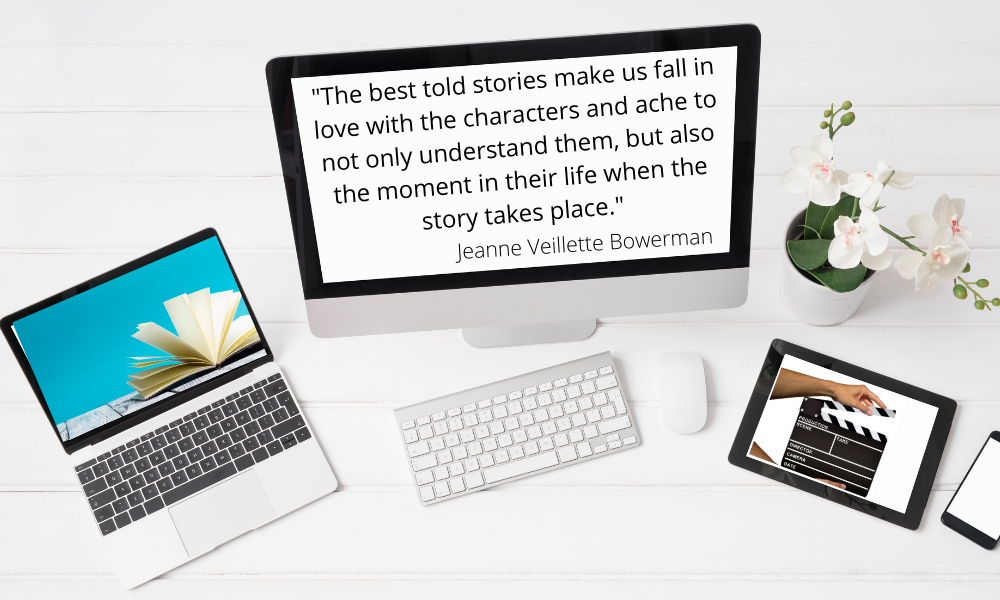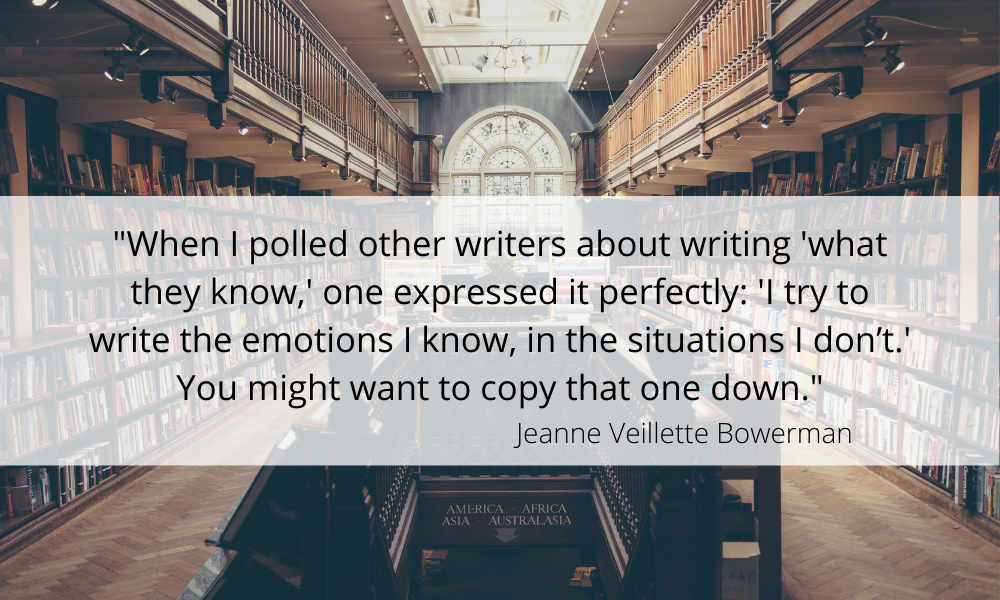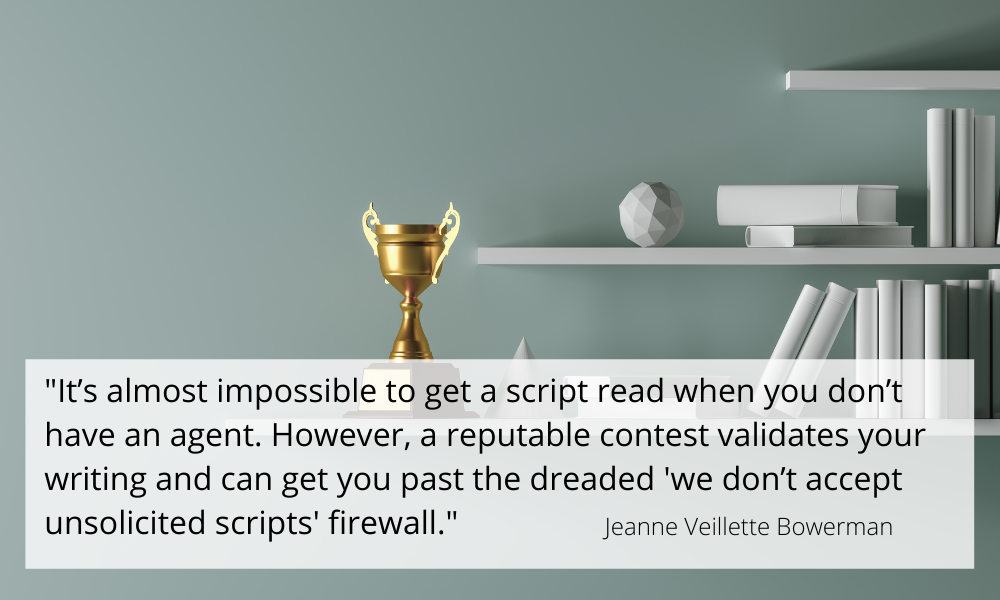Select the Perfect Script Software
There are nine different script formatting programs available on the market today. Use our guide to discover which one is right for you.
Today's scriptwriter no longer needs to manually crank that first sheet of paper into the typewriter or set margins on the computer word processor. Thanks to modern script-formatting programs, you can type away your first script like a seasoned professional. Unfortunately for new writers, there are dozens of script formatting programs and add-on programs for your current word processor. While this might sound like a great thing--competition often breeds better products--the reality is that each of these programs offers something different, and that something may not be what is right for you. The first question to ask yourself is, "Do I need a script formatting program?" The basic rules of industry standard format are the same today as they were in the era of manual typewriters. So, if you decide not to use a specialized program, you'll need to learn those rules. Yes, any typewriter or word processor can be used, but pagination, dialogue and scene descriptions can become a challenge. There are rules for breaking scenes across two pages. A different set of rules applies if you break a character's dialogue across two pages. The value of a specialized program should be self-evident. Wouldn't you rather concentrate on crafting witty dialogue or complex plot twists than worrying about margins and page breaks? There are two types of programs available: add-on macros for word processing programs and script formatting programs
Add-ons
Add-on macros make a standard word processing program like Microsoft Word or WordPerfect into a dedicated script formatting program. The main benefits of using macros are the lower costs and the ability to share files with anyone else using a standard word processor. If you're already familiar with Word, you might want to consider using macros instead of learning to use a brand new full-featured script formatting program. Four of the most popular add-ons for Word are ScreenStyle, Script Werx, Script Wizard and ScriptWright. There's even a new add-on program called HollyWord. While they don't offer as many of the flashy features you'll find in dedicated script formatting programs, each of these bargain-priced add-ons will make formatting your script a breeze.
ScreenStyle
Big Screen Software, 3010 Hennepin Ave. S. #278, Minneapolis, MN 55408, (888)627-8812, www.screenstyle.com, $29.95
ScreenStyle software can honestly boast that it's the least expensive scriptwriting add-on available for Word. Since 1996, ScreenStyle has managed to become quite popular among amateur and professional screenwriters looking for a low-cost alternative to dedicated script formatting programs.
The beauty of ScreenStyle (available for both Windows and Mac) is its ease of use. With just the Tab and Enter keys and the ScreenStyle toolbar, you can meet the margin and spacing requirements for slug lines, scene headings, action lines, characters, dialogue, and page breaks. ScreenStyle automates everything from the title page to "Fade Out."
The newest version for Windows gives you a Character Recall function that remembers your character names so you only need type the first few letters. ScreenStyle even offers a 30-day money back guarantee if you are unsatisfied with the product.
Other screenwriting programs work as stand-alone word processors and cost hundreds of dollars. But if you already use Microsoft Word for Macintosh or Windows, ScreenStyle is all you need. It's easy to install and easy to learn.
Additional features like outline view, scene numbering and a bookmark feature make ScreenStyle one of the best options for amateur scriptwriters who aren't sure if they're ready to invest in a more expensive and feature-packed program.
Script Werx
Parnassus Software, 1923 Lyans Drive, La Canada, CA 91011, (818)952-8102, www.OriginalVision.com, $129
Script Werx (available for Windows and Mac) is a package of 12 templates, each of which customizes Microsoft Word far beyond the usual styles and recorded macros.
Every template provides up to 3 new toolbars, a Script Werx menu and dozens of new shortcuts and tools, most of which are complete with on-screen instructions. There are templates for feature films, corporate and informational videos, live-tape TV scripts, three-camera TV scripts, video formats, two-column format, four-column format, combination format, storyboards, treatment, and more.
One of the most interesting templates is the "backup" template, which is used by the Script Werx tools to create documents such as shot lists and teleprompter files.
Script Werx also makes it easier to assign keyboard shortcuts to often-used words or phrases. In the Often-Used Words dialogue box, simply type in a word or phrase. Automatically, a key combination will be created using the first letter of the name.
Whether you're writing a screenplay or a corporate video, you won't have to worry about margins, styles or formatting. Script Werx ensures that your script projects a professional image. The screenplay and teleplay formats are based on guidelines from the Writers Guild of America and The Complete Guide to Standard Script Formats. The corporate video formats are based on over 20 years of experience writing video scripts for the corporate market.
Any script created with Script Werx is a standard Microsoft Word file, which can be opened and edited on any computer using the appropriate version of Word. All styles stay with the script itself, so the recipient sees exactly what you created on your computer and any revisions made will be in the correct format.
Using Word's revision features, revisions can be made in a distinctive color, giving you the ability to easily spot every revision and accept or reject revisions on an individual basis.
Script Werx also includes a user's guide that provides more than 120 pages of easy how-to advice, helpful hints and step-by-step instructions on using Script Werx. Each script format has its own chapter that specifically addresses that format without getting bogged down in other formats or technical detail.
Script Wizard
Stefani Warren & Associates, 1517 Hillside Drive, The Woodlands, Glendale, CA 91208, (818)414-8609, www.warrenassoc.com, $69
Script Wizard V9.0, (2002) for Word 97, 2000 and XP is arguably the most comprehensive add-on available on the market. There are templates for 12 professional script formats, including screenplays, sitcoms, soaps, radio-style scripts, stage plays, two-column Audio/Visual and storyboard formats.
Scriptwriting toolbars and menus appear only when Script Wizard files are opened, and disappear again when they are closed. Display options are maintained separately from those which the user sets for work in basic Word For Windows. And you can run as many other add-ons and add-ins as your computer's working memory will allow.
One of the principle benefits of using an add-on program instead of a dedicated script formatting program is that the files can go almost anywhere. Anyone with any version of Word or Word Perfect can download, read and/or print a script using a Word add-on. Any producer can import and export Script Wizard files to and from any standalone program.
Shortcut keys and toolbar buttons make writing and formatting scripts quick and easy. Use a single Ctrl-key combination or click once on a toolbar button to format sluglines, action, character names, dialogue, parenthetic notes and transitions. All standard script notations are typed for you. The Character editor stores repeatedly used character names for writing dialogue; select a key code, a toolbar button or a menu item to have the formatted character's name entered into your script automatically.
Completely automated script processing utilities prepare your scripts for printing. Script Wizard makes intelligent page breaks for scenes and transitions, and inserts (MORE) and NAME (CONT'D) when dialogue is split across pages.
One of Script Wizard's nicest features are bookmarks that can be placed when you quit work today--allowing you to come back to the exact same place in your file tomorrow, next week, or whenever you decide to get back to work.
ScriptWright
Indelible Ink, 261 Fifth Ave., Mezzanine, New York, NY 10016, (212)255-1956, www.kois.com/ink, $129.95, ($49.95 for students)
ScriptWright 2000 for Microsoft Word 97/2000 (different versions are required for Word 6 and 7 or for Mac) is another add-on that can transform Word into a screenwriter's best friend. You can place ScriptWright's commands under standard Word pop-up menus, or place all of ScriptWright's commands on a drop-down menu under the standard menu tab. Toolbars for styles, revisions, and major features can be turned on or off.
This add-on formats your script in any of three standard, professionally approved layouts: "Draft," "Master," or "Shooting," inserting break strings for dialogue and scenes as needed.
Fully integrated with Word for Windows, ScriptWright allows you to take full advantage of outlines, hidden styles (for notes and annotations), and revision marks (for changes between drafts) without disabling any of Word's built-in features. The Filesafe feature makes it impossible for unauthorized individuals to make changes to your document.
To help make things easier for you when working in other programs, ScriptWright includes conversion macros for importing scripts written in other word processors. Additional features like auto abbreviations, side-by-side dialogue, print selection, note file, document history, and revision management all make the writing process a bit less stressful.
SmartEnter and SmartTab keys allow you to move from style to style, and insert character names, with only the Enter and Tab keys.
Some of ScriptWright's strongest features include "cheating," format check and the outliner. "Cheating" modifies the margins to reduce page count, therefore preventing a line of dialogue or scene description from running onto the next page. ScriptWright can cheat one element, a group of elements, or the entire script. The format command checks to insure that the script is properly formatted before printing. Anything that doesn't belong--extra returns, duplicate punctuations--is deleted. The outliner helps you create Act and Sequence groupings to help organize the script's structure. The program's only major limitation is that it only handles the standard feature-film screenplay format.
HollyWord
Simon Skill Systems, Box 2048, Rancho Santa Fe, CA, 92067, (888)234-6789, www.hollyword.com, $84.95, ($59.95 for students)
HollyWord is a relatively new kid on the block in the realm of add-on software. Compatible with almost every version of Word for Windows or Mac, HollyWord promises to give other add-ons a run for their money.
As you type, HollyWord formats your screenplay automatically--letting you focus on the story and not the formatting.?When you finish writing a paragraph of action, HollyWord automatically sets the margins for character name and sets for all-caps; finish entering the character name, and HollyWord automatically sets the margins for writing dialog. And so on.
The program provides page numbering, scene numbering (remember, you shouldn't list scene numbers unless your script is ready for production), MOREs and CONTINUEDs, and can be easily set to enter your character names with a keystroke.?HollyWord even features "StoryCards" which let you see the structure of your entire story at a glance as you write ... you can even rearrange the screenplay in an instant.
The toolbar includes the standard shortcuts for slugline, action, character, parenthetical, dialogue, transition, slugline and StoryCard.
Last but not least, you can even personalize your copy of Hollyword. You can alter the default margin settings, change fonts, change line spacing and even alter the placement of MOREs and CONTINUEDs.
Programs
If you have bothered to look for script formatting software in recent years you no doubt discovered that several companies claim to dominate the scriptwriting market. In truth, Final Draft, Screenwriter 2000 and Scriptware dominate the market for dedicated scriptwriting programs, and all three sell for around the same price (about $200). None of these programs are particularly demanding of your hard drive space or memory--there is even a DOS version of Scriptware available for people still using old 286 PCs. All produce scripts in screenplay, sitcom, and stage play formats. All are capable of displaying a screenplay in an index card view.
Final Draft, Screenwriter 2000, and Scriptware are available for Windows and Mac and are all cross-platform compatible (each program can read files formatted for other programs). All three can print reports and export a script breakdown file for use in Movie Magic's Scheduling program--this makes them much more useful for professional screenwriters or independent filmmakers. However, there are differences that you should be aware of before making your purchase decision.
In addition, we'll also cover Page 2 Stage, a less-expensive alternative for those who want a dedicated script-formatting program. Keep in mind that these are only script-formatting programs. All of these programs will put your script in the proper format and make your script look professional, but they can't develop a script for you. If you need help developing your story, look in our resource directory (page 61) for information about programs such as Dramatica Pro or StoryCraft.
Final Draft
Final Draft, Inc., 16000 Ventura Boulevard, Suite 800, Encino, CA 91436, (818)995-8995, www.finaldraft.com, $199.95
Final Draft looks and works very similar to Microsoft Word. In fact, if you love using Word but decide you need the added features of a dedicated script formatting program, Final Draft is exactly what you need. This familiar, user-friendly interface may be one of the reasons that Final Draft is considered the industry leader in sales.
Unlike some of the add-ons, Final Draft makes it easy to adjust margins, change line spacing or shift page breaks. Click on the toolbar at the top of the screen and you can instantly customize settings for every element and feature and save them as a template for future scripts.
Speaking of templates, Final Draft gives you dozens of templates for television's top shows. Whether you want to write a spec script for Buffy the Vampire Slayer or Days of Our Lives, you can write your spec script in the format the show expects. Improved standard script templates are also included--new television shows, improved U.S. and British stageplay templates, as well as improved screenplay templates. One of Final Draft's stronger selling points, however, is that it is one of the preferred file formats for WGA online registration.
Perhaps the greatest gem of a feature for new users is Final Draft's highly user-friendly on-screen manual; it's just a mouse click away if you get completely lost. The printed user's manual is also extremely easy to read and provides a quick introduction to script formats and step-by-step instructions for typing and printing your script.
Final Draft's latest update (version 6) is compatible with Mac OS X and Windows XP and includes the Ask the Expert feature. Amateur scriptwriters can now turn to a computerized version of script consultant Syd Field to help them solve problems with character, plot or structure.
If there is anything bad to say about Final Draft, it would be that it acts a little too much like Word. Since this is a stand-alone program, the designers could have made the user interface even more user friendly for people who aren't familiar with Word. Movie Magic Screenwriter 2000
Write Brothers, 138 N. Brand Blvd., Suite 201, Glendale, CA 91203, (800)84-STORY, www.screenplay.com, $249
Write Brothers (formerly called Screenplay Systems) brings you Movie Magic Screenwriter 2000. Screenwriter 2000 is based on ScriptPerfection's ScriptThing and Screenplay Systems' Movie Magic Screenwriter--both impressive programs. The program comes with modifiable formats for feature films, taped sitcoms, filmed sitcoms, radio, and stage plays. Just like Final Draft, templates for more than 50 currently airing television shows are included---you can even download new ones from the Internet.
I've mentioned in previous reviews that Screenwriter 2000 is fast. In truth, it's the fastest dedicated program I've used. If cranking out a script at warp speed is important to you, this program should probably be at the top of your list. If you're interested in Screenwriter 2000, you'll be happy to know that it is also one of the preferred file formats for WGA online registration.
This program also has a text to speech feature similar to what you see in Final Draft. There are a selection of voices to choose from and options to let you decide what will be read aloud. Some may find this useful; others will think it's a waste of hard drive space.
Ipartner is a unique feature in Screenwriter 2000 that allows people to collaborate on a script over the Internet. Final Draft uses a similar feature called CollaboWriter, but I found Ipartner to be easier to use. For most people, however, an online collaboration feature isn't particularly useful.
The single most impressive feature that Screenwriter 2000 offers is its user interface. Unless you desire a program that operates like Microsoft Word, you will find Screenwriter 2000 very easy to use. Let me put it this way: If you want to write scripts, but aren't very comfortable around computers, Screenwriter 2000 is the program for you.
Scriptware
Cinovation, 1750 30th Street, Suite 360, Boulder, CO 80301-1005, (800)788-7090, www.scriptware.com, $299.95 retail, ($199.95 sale)
Scriptware is a straight-forward formatting program. While it's possible to dive right into Scriptware without much knowledge of script formats, the program doesn't include as many of the templates you'll find in Screenwriter 2000 and Final Draft. This means you may need a book on script format or--heaven forbid--the lengthy user's manual. On the bright side, all the included templates are easily modifiable.
I was particularly impressed with Scriptware's gem of a typing system, Scriptype. Several other software companies have gone so far as to imitate this system in their programs. Simply hit the TAB or ENTER keys, and you will jump to the proper location on the page. The program takes care of all capitalization, centering, margin changes and pagination while you concentrate on writing. Scriptware also handles dual column dialogue with ease.
Though Scriptware is cross-platform compatible, I had trouble importing several different files. I recommend that you copy your script in Word or whatever other program you use and paste it into Scriptware. Just be sure to read over the script to make sure the entire file transferred in the correct format.
While Scriptware has an auto-save feature designed to make your life easier by saving your script in case of an accident, I recommend you turn this feature off on a Mac. It took three minutes to save a 116-page script on my G3 Mac! While I didn't experience this problem with the Windows version, Mac users should be warned. Do yourself a favor and wait to save your file until you need to take a five-minute break.
Despite a few minor irritations, Scriptware is an amazing program. There is a reason so many other manufacturers have tried to imitate this program. Simply put, Scriptware is a flexible workhorse that makes writing a script much, much easier.
Page 2 Stage
Windward Studios, 1127 Barberry Court, Boulder, CO 80303, (303)499-2544, www.page2stage.com, $79.95
Last on our list of dedicated script formatting programs is Page 2 Stage. This program supplies formats for feature films, sitcoms (taped and filmed) and stage plays. Page 2 Stage sounds like it would be more popular among playwrights, but it is also capable of serving the needs of screenwriters.
Page 2 Stage is yet another program with a user interface very similar to Word. There is a standard toolbar that lets you to retrieve files, print, spell check, create new script elements or hide any element with one click of the mouse. Page 2 Stage is currently only available for Windows platforms, so you'll need to look elsewhere if you use as Mac.
Though Page 2 Stage might look like a glorified version of Word, it has all of the standard features found in dedicated programs: smart tabs, proper handling of page breaks, dual column dialogue, spell checker, thesaurus and script notes. There are even pop-up boxes for location, time of day and character names.
One feature many will find useful is the scene details report. Page 2 Stage can generate a report giving you a detailed summary of each scene including the percentage of the scene spent in dialogue, action, etc. The scene details report also gives you a summary of the script as a whole.
Page 2 Stage can't export to Movie Magic Scheduling or other production programs, so professional scriptwriters and independent filmmakers might not find this program too appealing. Still, Page 2 Stage is the least expensive dedicated program on the market and offers several excellent features. If you need some of the added features you'll find in dedicated programs, but can't afford to spend $200, then Page 2 Stage is the solution to your problem.
Here's one final word of advice: Before you purchase one of these programs, test it out yourself. You can download a free demo for many of these programs at the company Web sites. Personal preference will probably be the deciding factor when choosing a scriptwriting solution that's right for you. The comments in this article are meant to help you narrow your options, but the perfect solution for one writer might not work for another.
This article appeared in the March 2003 issue of Scriptwriting Secrets.









